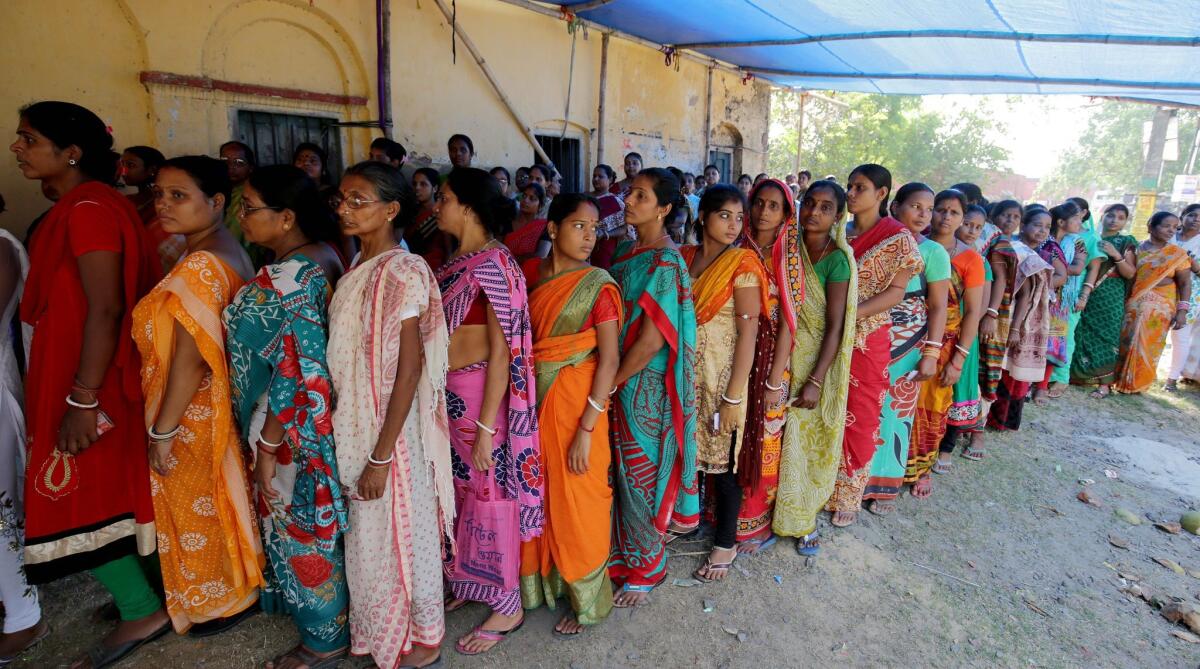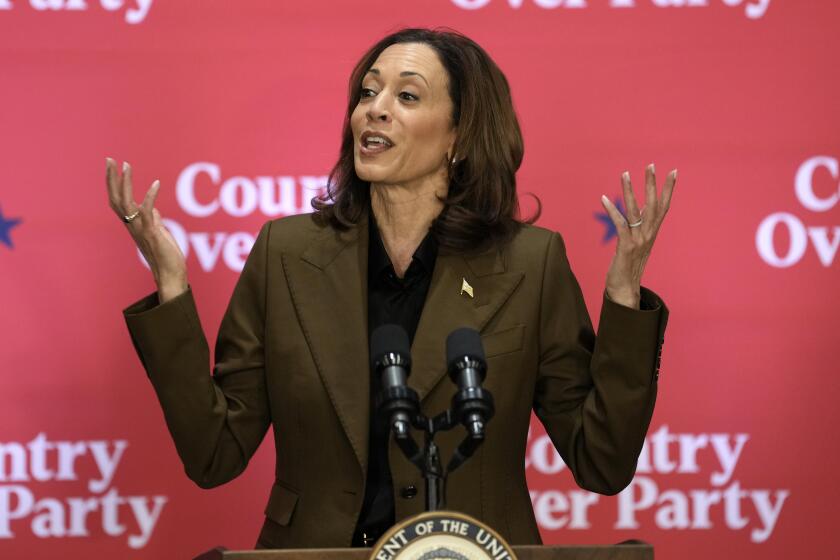Trapped for decades in a byzantine border dispute, these Indians are voting for the first time

Indian citizens wait to vote in state assembly elections at Halisahar Village, West Bengal, India, on April 25. Some residents of West Bengal are voting as Indians for the first time after the resolution of a complex border dispute with neighboring Bangladesh.
reporting from Haldibari, India — At age 65, Tahalu Raiburman is preparing to vote for the first time. “I feel I am worth something,” the stooped, bare-bodied man said with a grin, deepening his wrinkles.
Until last year, Tahalu was in an unusual position: He lived in one of 51 enclaves that belonged to India but were located just inside the border of neighboring Bangladesh. Tahalu was technically an Indian citizen, but India did not exercise authority over the enclave and Bangladesh provided the people there with no services.
The same was true on the other side of the border, where 111 Bangladeshi enclaves sat inside Indian territory. The small patches of no-man’s land, totaling about 45 square miles, were part of one of the world’s most complex boundary disputes, dating to 1947, when India was separated from a mainly Muslim territory called East Pakistan, which later became Bangladesh.
The hastily drawn border cut across the territories of former princely states, which were left with land on both sides. The rulers had to join one country or the other, effectively abandoning some of their territory and leaving residents there stateless for decades.
That changed when the Indian and Bangladeshi governments signed a long-awaited Land Boundary Agreement in March 2015, each agreeing to hand control over the enclaves inside its borders to the other and giving residents the opportunity to decide which country they wanted to live in.
Tahalu was one of about 1,000 who opted to move inside India’s formal borders. He now lives in a temporary settlement in Haldibari, about 12 miles from his former home. On Thursday, as one of his first acts of citizenship as a full-fledged Indian, he will cast his ballot in elections in the state of West Bengal.
“The Indian authorities conducted a training session by putting up a mock polling booth,” Tahalu said. “I have never been inside one until now.”
See more of our top stories on Facebook >>
While the transfer of land under the agreement is expected to conclude by July 2017, when residents are due to move into permanent homes, people began moving across borders and into temporary settlements like Haldibari last summer.
Dotted with one-room, tin-roofed houses freshly painted in blue and white, Haldibari consists of 96 families trying to stitch together a new beginning. Land is being dug for a pond where the people could breed fish. Children have been enrolled in nearby schools and adults are looking for jobs.
Asik Rai, 21, said he and other residents are mostly working as daily wage laborers on farms and tea plantations. The families get about 60 pounds of food, including rice and lentils, per month from the government.
“It is not easy adapting to a whole new environment,” Rai said. “We know the treaty has just been signed and it is an ongoing process but we hope to get permanent jobs eventually.”
Rai conceded that he missed his old home.
“I am obviously attached to the place, I was born there,” he said with a wistful smile. “We had to sell off our livestock and our farmland before coming here. My friends called me to check if I reached safely. I miss them.”
But he said it was not easy being an unprotected minority in Bangladesh. Hindus who lived in the enclaves, Rai said, suffered discrimination, land grabs and occasional assaults by majority Muslims.
“We often faced persecution,” Rai said. “Since we were not protected by the judiciary or police, we had nowhere to go to seek justice.”
Tahalu said due to that treatment, he supported India whenever the countries played each other in cricket.
“I never wanted Bangladesh to win because the country never treated us with dignity and respect. We have got that in India….We have an identity now.”
In West Bengal, which is majority Hindu, the new arrivals blend in easily. In front of every house sits a stone dedicated to the Hindu god Shiva, accompanied by ceremonial holy basil, onion and garlic. Women bow before the god every morning. Recently, in mid-April, they celebrated the Bengali new year by preparing their quintessential fish curry and rice.
Living inside Bangladesh, Rai said, India was a source of curiosity because of the perceived prosperity, employment options and, most importantly, Bollywood films. “I am a huge fan of Shah Rukh Khan,” he said, referring to one of India’s most beloved actors.
The residents of Haldibari expressed hope that the Indian government will ensure they get homes and job opportunities. One woman filling up pots from a water tap spoke up, a newborn cradled in her arms.
Referring to her daughter, Lobomita, the woman described her as “the most blessed soul in this enclave. She was born immediately the day after we moved in here.”
Parth M.N. is a special correspondent.
ALSO
New shipwreck off Taiwan is a must-see for many tourists
For Hindus far from home, online religious services can be a valued connection
The Donald Trump of Asia? Brash, unrepentant mayor leads Philippine presidential race
More to Read
Sign up for Essential California
The most important California stories and recommendations in your inbox every morning.
You may occasionally receive promotional content from the Los Angeles Times.










